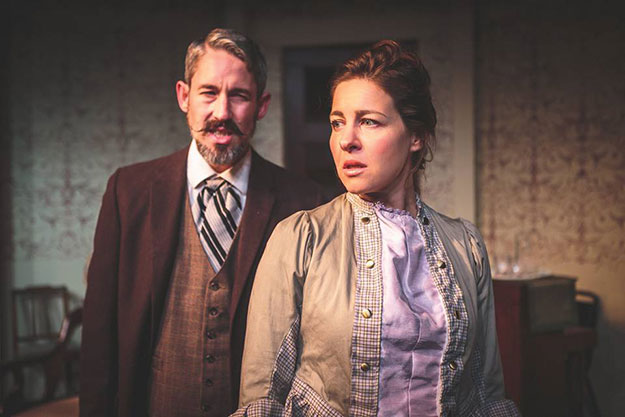Henrik Ibsen's famous and much-examined A Doll's House is a play that announces itself as being about one conflict, but eventually reveals itself to be about something far larger in scope. As produced by Tacoma Little Theatre, adapted by Marilyn Bennett and Lydia K. Valentine, with direction by Bennett, A Doll's House walks a very tricky line for much of its duration, pitched in a hazy area somewhere between comedy and tragedy. While many of the beats are designed to be comedic -- and frequently succeed -- I could not help but feel a cold wave of anxiety wash over me.
Set in Norway in the late 1800s, the story centers around a secret that dutiful housewife Nora (Annie Katica Green) has been keeping from her compulsively condescending husband Torvald (Sean Neely): years ago, while Torvald was ill, Nora took out a substantial loan to pay for his treatment. In not telling Torvald about this loan, Nora's lie is couched in both pride in having done a quiet kindness for her husband, and fear in how he would react to a woman carrying the financial burden for a man. An old school friend of Nora's (Kristen Moriarty) and a disgraced clerk (Jason Sharp) descend on Nora and Torvald's home to further complicate manners.
All of this coalesces into a story that -- in its most basic structure -- resembles a farce, with Torvald eventually being the only person left in the dark as to what's truly going on, and an increasingly desperate Nora working to ensure that it stays that way. But, removing all plot contrivances, smudging away the issue of the clandestine loan, A Doll's House is truly about the relationship between Torvald and Nora. Torvald has a way of being almost casually cruel to Nora, belittling her at every turn and reminding her of her insignificant role in their marriage; Nora, meanwhile, has built up a protective barrier of chipper, performative domestic bliss. A Doll's House is most effective when it observes how that burden has weighed silently, heavily on Nora's shoulders.
A Doll's House boasts a uniformly excellent cast, led by the richly nuanced performances of Green and Neely. Green deftly navigates Nora's journey from ostensible happiness, to despair, to her discovery of her deep wells of courage; Neely, in a very difficult role, makes this patently terrible man at least semi-likable for the majority of the play. Moriarty and Sharp are similarly solid in their parts, and Mark Peterson gets some big gallows humor laughs as an ailing friend of Torvald's.
The ending stretch makes the subtext text in a way that maybe needlessly spells out the themes of the show, but that bluntness might be the point: this is a period piece, yes, but the closing minutes sound as modern as any work that would be written today. Nora's predicament is not a concern of the past, but a reminder that the treatment of women as possessions has only become subtler and more insidious.
A DOLL'S HOUSE, 7:30 p.m., Friday-Saturday; 2 p.m., Sunday; Pay What You Can Thursday, Feb. 7, 7:30 p.m., through Feb. 10, Tacoma Little Theatre, 210 N. I St., Tacoma, $20-$25, 253.272.2281, tacomalittletheatre.com




Read Comments